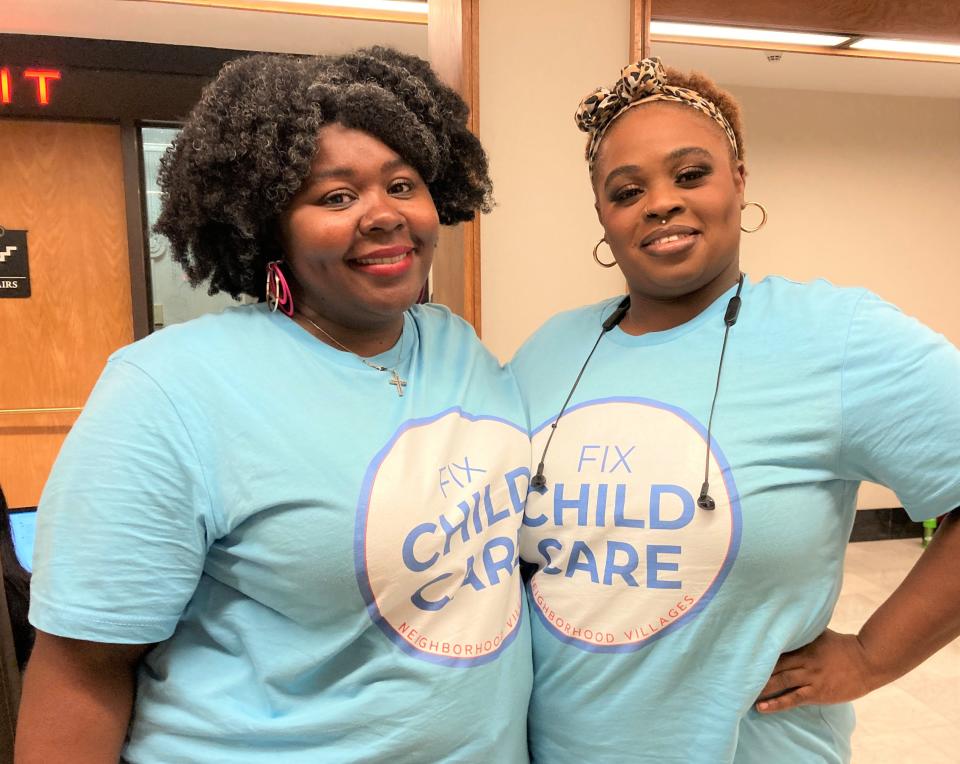Mass. weighs importance, cost of funding child care and early childhood education

BOSTON - The calls from desperate parents seeking child care come in daily to the Guild of St. Agnes of Worcester. Yet the organization, which serves roughly 1,700 children at 17 child care centers and 135 affiliated Family Child Care homes throughout the county, can’t help.
“In April, we opened a center with the capacity to accommodate 152 children; we had a waitlist of 60 children months before opening,” said Sharon MacDonald, president and CEO of the guild. “That waitlist has only grown because we can only open six of the 10 planned classrooms due to lack of teachers.”
Witness after witness testifying Tuesday before the Joint Committee on Education at the Massachusetts State House told members that child care and early childhood education is in crisis in Massachusetts.
They cited two main reasons: The expense and the lack of a qualified and trained workforce.
Massachusetts has the second-highest child care costs in the nation, second only to Washington, D.C., according to the U.S. Department of Labor. The average costs in the state range from $16,000 to $26,000, depending on the age of the children, the number in care and the location of the care provider. That is compared to the national average of $10,000 a year, with some states even lower, such as Mississippi at $4,400.
Staffing is also an issue. Qualified and trained teaching staff, as well as home day care providers, leave the profession due to the low rate of pay. Overall, the average child worker salary in the state ranges between $37,500 to $47,500, with an average salary of $41,591. Kindergarten teachers at public schools start around $52,000.
While Massachusetts does have a voucher system for low-income families, even with subsidies and other aid, families are desperate to find quality care. And caregivers are desperate for higher reimbursement rates from the state to offset the costs of the voucher program. The state pays from $23 for in-home day cares to $101 for infants in center-based programs.
Dozens of people attended the session to urge lawmakers to support companion bills on the issue filed by both Senate and House members. If passed, the Common Start bills could save the average family up to $13,260 a year in child care costs. The cost to the state would be $1.7 billion a year.
But witness after witness assured the committee the investment would be worth it for Massachusetts.
5 reasons to support bills
“There are five reasons to support the Common Start bills,” Rep. Kenneth Gordon, D-Bedford, told his colleagues on the committee that include benefits for workers, employers and children, a stable funding source for providers and living wage for teachers.
“It’s a win/win/win for Massachusetts,” Gordon said.
The bills provide a framework for supporting the industry, both to offset provider operating costs such as mortgages, insurance costs, benefit packages and salaries, and provide assistance to families to reduce their out-of-pocket costs. The reimbursement for vouchers would also increase to reflect the true cost of providing quality care.
The bill would establish a permanent state funding source, allocate funds to providers based on capacity rather than attendance and would be similar to the current Commonwealth Cares for Children program.
Priority would be extended to families earning at or below 85% of state median income, which includes almost half of all Massachusetts families with children under 14. That translates to $115,546 for a family of four or $78,571 for a family of two.
Help would also be available for middle-income families.
According to a UMass Boston report on the bill released earlier in the month, the state’s family poverty rate would decrease overall from 15.5% to 14.1%. More than 10,000 mothers would enter the workforce and parents would increase working hours significantly if families had access to affordable, high-quality and accessible care and early education.
Sen. Becca Rausch, D-Needham, asked why, if the cost of care is so high, are the salaries so low?
High cost, low wages a question of math
Math was the short answer. The long answer factors in the adult-to-child ratios mandated by the state — the younger the children, the more teachers needed in a room, the cost paid by a family and the state’s reimbursement rate for voucher clients. Reimbursement rates for vouchers, caregivers told committee members, do not cover the cost of care.
Funding child care and early education is also a question of racial, economic and social justice, as well as reproductive equity, witnesses told the committee.

Rory Millark, political and field director at Reproductive Equity Now, said equity is not possible with the second-highest child care costs in the nation. Massachusetts residents must make decisions on whether to become parents factoring in the accessibility of child care and the high cost.
As a first-time mother, Millark told the committee she pays $25,000 a year for care for her child, and it’s considered a bargain in her neighborhood. If she opts for more children, can she afford the cost?
“Family-planning decisions are influenced by the high cost of child care,” Millark said.
In her remarks, Lydia Magliozzi Icke of the Commonwealth Children’s Fund pointed out that early childhood education has a lasting positive effect on cognitive, social and emotional development in children. That children who have been exposed to early childhood education perform better in school, are more likely to graduate high school, have better health outcomes and greater earning potential.
80% of brain development before age 5
She was one of more than a dozen people who noted that 80% of brain development occurs between birth and age 5.
While the cost of fully funding child care and early education is high, the cost of inaction is even higher, Magliozzi Icke said. Young families are leaving Massachusetts because they cannot afford to stay, with housing and child care costs too steep. Women are leaving the workforce or cutting hours because they cannot afford to stay and pay child care.
She estimated the cost to the state in lost wages at $1.7 billion.
Early education fuels social, academic and economic opportunities for families and improves lifelong outcomes for children, said Traci Griffith, racial justice program director for the ACLU of Massachusetts.
Funding early childhood education is essential to decrease the access gap for people of color. Child care and early education also increase the economic mobility for traditionally marginalized communities, Adam Jones of the Massachusetts Budget and Policy Center told the committee.
In their remarks to the committee, many providers also thanked the legislators for the state’s investment in early childhood education in the form of C3 grants and other supports.
“The C3 grants were welcomed; however, I did not use the funding to increase teacher salaries," said Lauren Broadhurst Cook, CEO of Ellis Early Learning in Boston. She was reluctant to give her teachers a raise without being able to sustain the higher rate of pay once the grants expired. She did, however, give out bonuses but noted that even with the state investment today, teachers are just “less poor.”
“We need to think bigger and bolder, make an investment in the workforce,” Broadhurst Cook said, reminding the lawmakers that early childhood education and child care does not exist without teachers. “The economy would collapse without them.”
This article originally appeared on Telegram & Gazette: Bill to fund childcare, early education could cost state $1.7 billion

